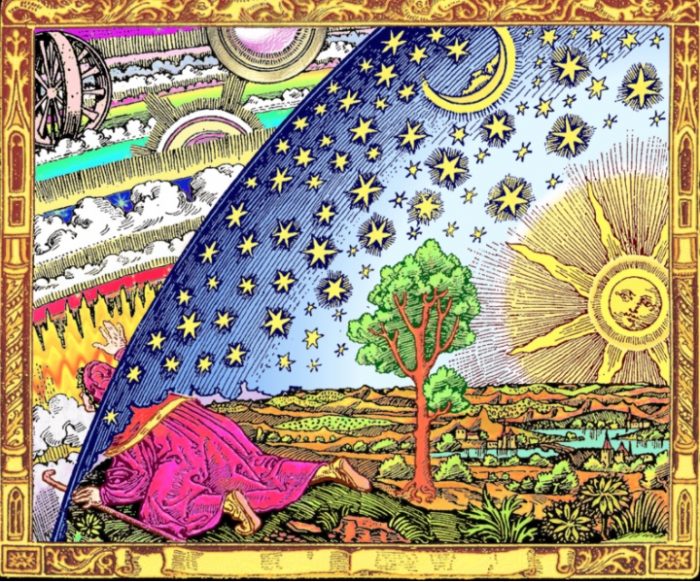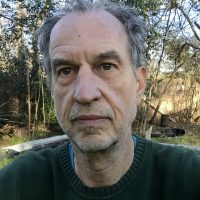Knowledge
What do we know? What can we do with it?
It was less than 100 years ago that we thought the Milky Way was the whole universe; there was nothing beyond it.
A couple of hundred years before that we thought the starry sky was the firmament of heaven or rather the stars were holes in the firmament of heaven revealing, if only a tiny bit, the glorious and pure light emanating from the other side where God lived.
A few centuries before that, people thought the stars were gods and goddesses and they had emotions and they interfered in human affairs.
Today, thanks to our rapidly evolving technology, that we are so proud of, we know that there are 100 billion galaxies beyond our own and that each of them contain 100 billion stars and that they are rushing away from us at a tremendous speed, enlarging the known universe as they go.
We know that the stars are made of hydrogen and helium; hydrogen fusing into helium being the energy source.
We know that all the heavier elements: oxygen and carbon and iron and all the rest, were created inside dying stars as they collapsed and fell in on themselves and exploded in one final spasm, one giant cosmic orgasm.
We think we know everything basically. We are smarter than the monkeys and way smarter than the dogs. Our opinions and ideas carry the weight of our spectacularly successful modern lifestyle. But that’s not very smart. The universe continues to expand and so does human knowledge, so why shouldn’t we?
For example, take a country like the United States. The country where I live. They came up with this idea, the ‘United States’, 250 years ago, back when there were only 13 of them, they were having wars with muskets and bayonets and wooden ships. So much has changed! There’s 50 states now, the population has increased by a hundred times, the racial diversity is unparalleled anywhere in the world and would have been unthinkable 250 years ago. The land area of the nation has increased some twenty fold over what it was back then but we still plod along with the same archaic notions of how to do things.
The truth is we are afraid to change lest someone grab control and tweak the system to their benefit. Well that has already happened but it’s not the subject of my dissertation. We are afraid to change because we don’t know what will happen to our comforts and our assumptions. We’re unsure of ourselves.
And herein is the subject of my dissertation – we need knowledge of ourselves in order to successfully navigate this treacherous journey from gods in the sky to an expanding universe to a dying biosphere. We need to admit and recognize that we don’t know that much about the most important subject, ourselves.
“Ourselves.” Let’s see, that would include our very existence, our being alive, being human, having emotions and aspirations and aesthetics and other abstract, non-tangible things. That would include our uncanny ability to communicate using representational logic encoded into sounds made by our vocal chords and modulated by our mouth and tongue. That would include the whole inner mind of a person, their psychology, their personality, their subconscious, those elements of our psyche that go back, back, back, to the first hominids, in fact all the way back through the evolutionary process to the first cells that sprang into life somehow with their beautiful aspiration to keep it going, to replicate, to make it better.
We don’t know diddley-squat about all that stuff. Oh yeah, we’ve had some great scientists: Freud and Jung, Einstein and Hubble. We’ve figured out how to make machines fly through the air. We’ve figured out how to make images fly through the air. That’s not too shabby, but we still fight wars as if we haven’t learned anything.
War is a dumb idea for more ways than I care to elucidate. Self-obvious. What isn’t self-obvious is ourselves. Why do we go to war? Why do we practice domination and control instead of cooperation and sharing? The record of life on earth is the record of organisms learning how to get along and benefit from each other. Predation and competition are also elements in the story of evolution but so is symbiosis in equal measure or greater. I don’t know if anyone has measured it. The biosphere didn’t develop millions of interdependent species living together on one planet because they were constantly destroying each other.
Those tiny single-celled organisms floating around in the primordial oceans of early earth for 3 billion years? They were busy experimenting with this thing called ‘being alive’. They had nothing better to do. They explored speciation – making new species, hey let’s try something different, new and improved. They explored communication, by building messenger molecules and sending them off like a note in a bottle to land on some foreign beach and inform some foreign organism of something. They explored using resources that others had discarded as useless. This is the way of our ancestors. These are our deepest traits.
Nowadays we have encoded them in our moral principles: do the right thing, the flower road, jihad (which in it’s original meaning means the internal struggle for righteousness), love your neighbor as yourself. All the good stuff the good people told us. Nobody understood them though, instead we made them into religions. Yin and yang, stay in balance. Hold an impartial view towards the good and the bad.
What a concept. For America in the year 2020, divisiveism is the religion. Everybody’s worshiping at that altar. What people don’t realize is that this religion is not going to take us anywhere we want to be.
Self-knowledge would help with all that. Our politics, our societies, our systems and agencies would all run better. Our governments would hum like a doughnut shop, you know like a Krispy Kreme where they automatically make things in huge vats and they come out perfect. Bad analogy. Ok, our governments would hum like a . . . like a governing thing is supposed hum. Kind of a low incessant murmur of dynamic conversations, of things happening, things moving forward for the greater good, for the benefit of our children and their children. The hum of taking the best ideas and agreeing on a compromise.
That’s my politics. Explore the potential of human knowledge or the knowledge of being human, either way, and see what you come up with. See if it’s useful. See if it makes your life better.
Maybe it’ll start a trend. Maybe it’ll catch on. One day it could be that the real wealth is in the form of knowledge (as one day it was) and the competition will be who can give away the most not who can grab the most (as one day it was). Then, I believe and hope, that all or any of our systems would work, whatever system we choose to get organized would be just fine.
Hey, and one other thing. We could finally get to be homo Sapiens, the ‘wise humans’. That would be an amazing discovery, right up there with the greatest breakthroughs ever. Taming fire, inventing language, domesticating plants, building cities and going to the moon. In fact it would be the culmination of all that. A crowning achievement, people.











Read 0 comments and reply